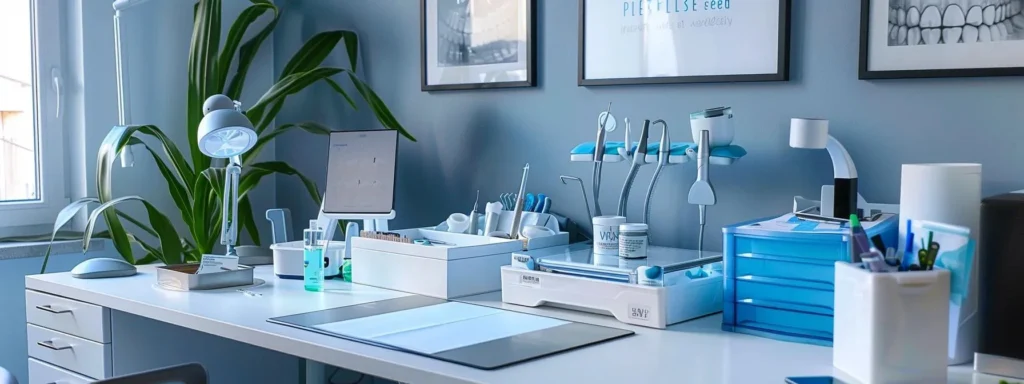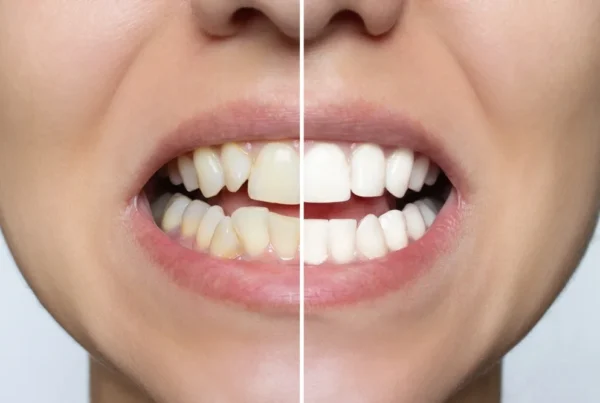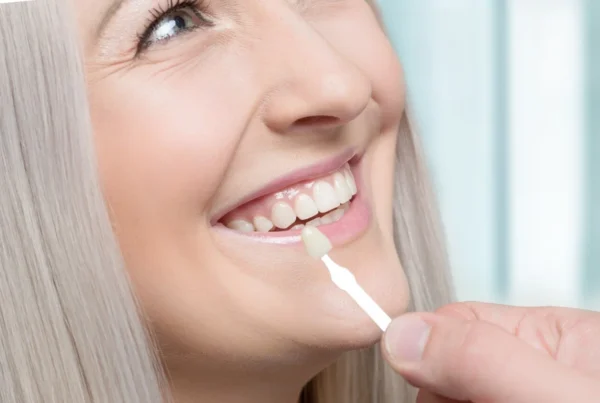Veneers are not just a cover for dental imperfections but a strategic choice for improved oral health and increased self-assurance. When investing in veneers, patients are making a decision that will impact their well-being in multiple ways. This dual nature of veneers presents them as both a cosmetic and protective solution.
The first major benefit of veneers is their ability to tackle visual dental issues head-on. By concealing discoloration, chips, or gaps, veneers provide an immediate and noticeable enhancement to one’s appearance. This can lead to significant boosts in confidence, as patients no longer need to feel self-conscious about their smiles. With the right care, veneers remain intact for many years, contributing continuously to a person’s positive self-image.
The second benefit of veneers lies in their contribution to dental health. Acting as a barrier, they protect teeth from further damage and can prevent the need for more invasive dental treatments in the future. Additionally, the materials used, notably porcelain and composite resin, are selected not only for their aesthetic qualities but also for their strength and compatibility with natural teeth.
Veneers provide an advantage through their durability. With proper maintenance, the high-quality materials used in veneers withstand years of use. They resist wear from daily activities like eating and speaking, which are essential to not only maintaining but also enhancing oral health over time.
Maintaining Your Veneers for Long-Term Success
Veneers, while durable, require careful attention to maintain their protective qualities over time. As protective covers for teeth, they can be compromised if not cared for correctly, making vigilant dental hygiene essential. This preventive approach is the key to preserving both the cosmetic appeal and the health benefits that veneers provide.
Maintaining structural integrity is the fundamental aspect of veneer care. Overlooking oral hygiene can lead to issues such as plaque buildup or decay that can undermine the stability of veneers. Patients should brush and floss regularly, especially around the veneer margins, to prevent any potential weakening of the bond between the veneer and the tooth surface.
The importance of consistent dental check-ups cannot be overstated. Regular professional evaluations help to catch and address any early signs of veneer wear or failure:
- Structural Maintenance: Regular brushing and flossing around veneer margins prevents plaque buildup and bond weakening
- Professional Monitoring: Routine dental check-ups allow for early detection and timely intervention
- Adhesion Protection: Avoiding excessive stress from hard foods or teeth grinding preserves veneer bonds
- Preventive Care: Proactive maintenance extends veneer lifespan and protects underlying teeth
Safeguarding the adhesion involves avoiding behaviors that place excessive stress on veneers. Habits such as using teeth as tools or biting hard objects directly affect the bond’s integrity. Educated and cautious personal care can significantly reduce risks.
Adapting Your Daily Habits for Veneer Protection
To optimize the life span of veneers, patients are encouraged to examine and modify their daily habits. Veneers are durable but not indestructible, making behavior a key factor in their maintenance. The integrity of veneers can be upheld through informed and deliberate changes in routine actions.
One crucial adjustment involves avoiding biting down on hard substances such as ice, candies, or objects like pens and nails. These materials can exert undue pressure on veneers, risking chips or cracks. Patients should be mindful of what they bite and chew to prevent accidental damage, thus preserving the aesthetic and functional aspects of their veneers.
Another area requiring change lies in oral hygiene habits. Veneers require a specific approach to care, including gentle brushing and flossing to maintain bond strength without causing wear around the edges. By adopting these targeted oral care techniques, patients can significantly extend the durability and appearance of their veneers.
Comprehensive awareness and education about veneer care after the procedure are crucial for long-term success. The dental professional should provide clear guidelines and illustrative examples of best practices and potential risks, enabling patients to make the necessary lifestyle modifications that contribute to the health and longevity of their veneers.
Clearing Up Common Veneer Misconceptions
Clearing up the myths surrounding dental veneers is important in guiding patients towards informed decisions. Misunderstandings about their use can lead to hesitancy, necessitating clear and honest education on the advantages and realities of veneers. This transparency is key to patient acceptance and the long-term success of veneer applications.
Fears about veneer fragility comprise one widespread misconception. Patients may believe that veneers are prone to cracking or popping off, but in truth, modern veneers are crafted from durable materials designed for longevity. Dental professionals should provide factual information on veneer resilience, combating the myth with evidence of their suitability for everyday use.
There is also a belief that veneers drastically alter tooth structure. While preparation does involve modifying the tooth’s surface, advances in dental technology ensure this process is minimally invasive. Clear communication about the precise nature of the procedure can ease fears about extensive permanent changes to one’s natural teeth.
Another area of misconception lies in the concern that veneers require intensive maintenance. However, caring for veneers does not differ significantly from normal dental care routines. Patients should be educated that with regular brushing, flossing, and dental check-ups, veneers maintain their appearance and function.
How Modern Technology Improves Veneer Results
Recent advancements in dental technology have transformed the way veneers are crafted and fitted, leading to more reliable and aesthetically pleasing outcomes. Patients now benefit from procedures that integrate these innovations, securing satisfaction through the precision and beauty of their veneer results.
Digital smile simulations represent one of these key advancements. They allow patients to preview the expected results of veneer placements, creating an opportunity for anticipation and adjustments before any physical work begins. This personalized preview increases the likelihood of patient approval of the final look, minimizing the risk of post-procedure dissatisfaction.
The use of Computer-Aided Design and Computer-Aided Manufacturing (CAD/CAM) systems is another leap forward. It permits dentists to design and create precise veneers with minimal waiting time:
- Digital Smile Preview: Patients can see expected results before treatment begins, ensuring satisfaction
- CAD/CAM Precision: Advanced systems create accurate veneers with reduced waiting time and human error
- Advanced Materials: Lithium disilicate provides strength and translucency matching natural teeth
- Improved Aesthetics: Modern materials appear more natural and resist staining better than older options
The use of advanced materials like lithium disilicate addresses old concerns about veneers appearing fake or being too delicate. This material’s strength and translucency are more similar to natural tooth enamel, leading to results that are both resilient and indistinguishable from natural teeth.

Monitoring Your Veneers for Early Problem Detection
Veneer longevity depends on early detection of wear or damage, which can reduce the progression of issues and prevent extensive dental procedures. A proactive stance towards monitoring is essential for ensuring that veneers maintain their integrity and continue to perform their function effectively over time.
Observing the color and surface texture offers the first indication of veneer wear. Changes in color, such as staining or dullness, might signal that the veneer’s protective glaze is compromised. Surface irregularities like scratches or roughness can also suggest that the veneers are beginning to wear. Patients noticing these changes should not delay in consulting their dentist.
Physical sensations can also serve as early signs. An unusual bite feeling or increased sensitivity to temperature could indicate a weakening bond or a crack in the veneer. Such sensory changes are often the first red flags that are personally detected, prompting the wearer to seek immediate dental attention.
Routine dental check-ups play a crucial role in identifying wear that might not be visible or felt by the patient. Regular examinations by a professional can uncover minute or developing issues, such as edge lifting or micro-leakages, that could evolve into more serious complications if left unaddressed.
Education: The Key to Successful Veneer Care
Providing patients with comprehensive knowledge about veneer care is crucial for enhancing their longevity and the overall success of the treatment. Dentists must ensure that patients are well-informed about the realities of living with veneers, including correcting common misconceptions and clearly communicating the maintenance required.
One aspect of education is informing patients about proper veneer hygiene. This includes specific techniques for brushing and flossing around veneers without causing damage. Dentists should guide patients on the appropriate products to use, such as non-abrasive toothpaste and soft-bristled toothbrushes, to maintain the shine and adhesion of their veneers.
Another key educational point is the importance of returning for regular dental visits. During these check-ups, dentists can inspect the veneers for any potential issues and perform professional cleanings that preserve the veneer’s appearance and integrity. Patients should understand that these visits are preventive measures that contribute significantly to the long-term viability of their veneers.
Correcting veneer myths is fundamental for patient confidence and satisfaction. Realistic expectations can be set by correcting misinformation and clarifying what veneers can and cannot accomplish. When patients are aware of the factual benefits and limitations of veneers, their trust in the treatment and their commitment to care will naturally increase.
Following Your Veneer Care Routine
For dental veneers to persist in their optimal state, a steadfast commitment to specific care routines is essential. By engaging in a proactive approach to maintenance, patients play a crucial role in the longevity and effectiveness of their veneers. A disciplined routine not only aids in preserving the appearance of veneers but also ensures that their protective qualities remain intact.
Avoiding substances that could damage the veneer’s surface is a critical component of care. Hard items such as ice or nuts and staining agents like coffee or red wine should be consumed cautiously or avoided altogether. Such a preventative strategy minimizes the risk of chipping or staining and keeps veneers looking as pristine as the day they were placed.
Excellent oral hygiene is another fundamental aspect of veneer upkeep. Thorough daily cleaning, with an emphasis on gentle techniques that avoid dislodging or scratching the veneers, supports their continuous function. It’s important for patients to undertake proper brushing and flossing and to use products tailored for veneers.
Routine dental assessments form an anchor in the care of veneers. Regular professional examinations allow for early detection of potential issues that the patient might not notice. These check-ups supplement home care and confirm that the veneers are in good condition, providing reassurance and allowing for prompt treatment when necessary.
Your Investment in Confidence and Health
The implementation of dental veneers offers more than a visual transformation; they represent a significant proactive step in oral health care. By placing emphasis on both the cosmetic and protective properties of veneers, patients and dental professionals acknowledge the dual benefits veneers embody as part of a holistic approach to dental wellness.
Veneers are primarily sought for their immediate impact on a person’s smile, swiftly correcting common aesthetic concerns such as stains, chips, or uneven spacing. The resulting boost in confidence and satisfaction with one’s appearance is one of the most compelling reasons for patients to choose veneers as a solution to their dental needs. From a health perspective, veneers provide a physical shield for the underlying natural teeth, acting as a defense against further decay or physical damage.
At Fountain of Youth Dental, we understand that veneers represent a significant investment in both your appearance and oral health. Our commitment to using the latest technology and highest quality materials ensures that your veneers not only enhance your confidence but also provide lasting protection for your natural teeth. Ready to discover how cosmetic veneers can transform both your smile and your oral health? Contact Fountain of Youth Dental today to schedule your comprehensive consultation and learn how our personalized approach to veneer treatment can give you the beautiful, healthy smile that enhances your confidence and quality of life for years to come.
Frequently Asked Questions About Cosmetic Teeth Veneers
How long do cosmetic teeth veneers last?
Cosmetic teeth veneers, with diligent care, can last up to 10-15 years. Maintaining good oral hygiene and regular dental visits are key to their longevity.
Are veneers safe for my teeth?
Yes, veneers are safe and actually protect your teeth from further damage. They’re crafted from durable materials and offer a strong, protective layer when applied by a professional.
Will my veneers look natural?
Absolutely. Veneers are designed to mimic the appearance of your natural teeth, using materials that reflect a real tooth’s color and translucency, ensuring a seamless and attractive result.
Contact Fountain of Youth Dental today to schedule your consultation with Dr. Cappetta and discover how composite veneers can quickly and affordably correct your dental imperfections while preserving your natural tooth structure.
With Fountain of Youth Dental, you can stop settling and finally get the healthy, stunning smile you deserve!
Schedule Your Free Consultation Today!
Fountain of Youth Dental
5282 Medical Dr. #520 San Antonio, TX 78229 (210) 614-5481 Driving Directions





